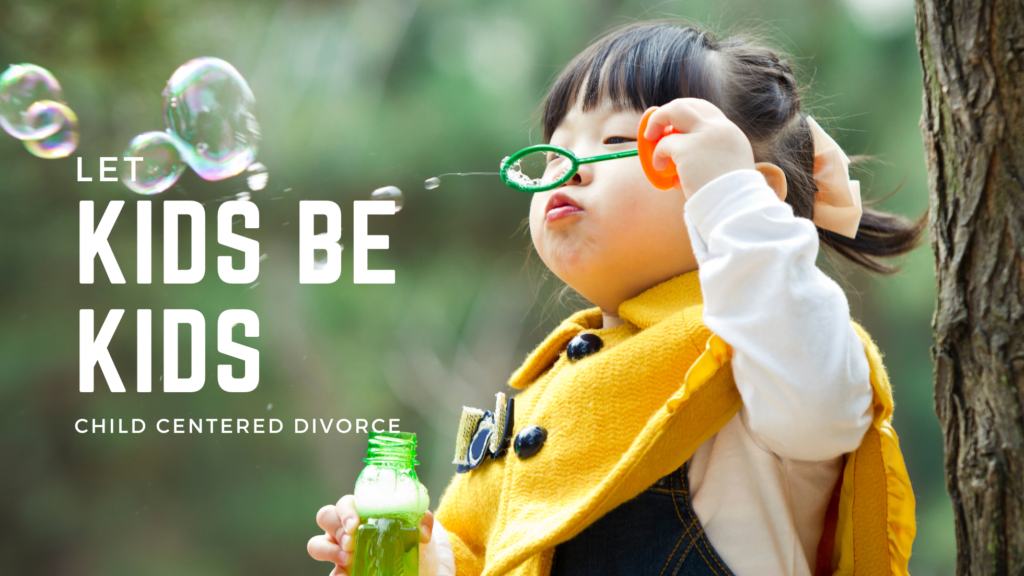Child-entered divorce – ok, what does that mean?
Divorce is never an easy process. The first thing parents usually say when they reach out to me to investigate their divorce options is they want the kids to come first. That means focus on a child-centered divorce.
Imagine a child-centered divorce as a process where the main focus and concern are the well-being and happiness of the children involved. Not who gets more of the 401k. Not who gets to keep the house. It’s like putting on a pair of kid-sized shoes and walking in them through the entire divorce journey. Concentrate on every step you take focusing on your children’s best interest.
Here’s what child-centered divorce really means:

- Prioritizing Kids’ Needs: In a child-centered divorce, parents work together to understand and meet their children’s emotional, physical, and psychological needs. It’s like ensuring your child’s favorite stuffed animal is always within reach when they need comfort.
- Reducing Conflict: Instead of arguing and fighting in front of the kids, parents in a child-centered divorce choose to communicate calmly and respectfully. Imagine turning down the volume on disagreements to protect your child’s sense of security.
- Working as a Team: Even though the parents are no longer together, they act as a team regarding parenting. Picture two coaches guiding a soccer team; they may have different strategies, but they both want the team (the kids) to succeed.
- Maintaining Stability: Children thrive in a predictable environment. So, parents in a child-centered divorce strive to keep routines consistent and stable. Yes, between households. It’s common for rules to be different in different homes. One parent might think it’s fun to have ice cream for dessert and stay together watching TV until the wee hours. Your kids are children, not friends or stand-ins for your spouse. While you, the adult, may be able to justify or enjoy this behavior, is it best for your kids? Having a daily schedule that your child can rely on, like knowing that bedtime stories happen every night no matter whose house they’re sleeping in, can help them adjust to this newly shaped family.
- Listening to the Kids: Children have their own feelings and worries about divorce. Parents listen to their children’s concerns and emotions in a child-centered divorce. It’s like giving your child a voice and ensuring they feel heard and understood. Essentially, it means you keep your ears open to their feelings and quiet about anything negative or judgmental about the other parent.
In essence, a child-centered divorce is about putting your child’s needs and emotional well-being at the forefront of every decision you make during the divorce process. It’s being your best self, even in the most challenging times, to ensure your child feels loved, safe, and cared for.
Divorce is emotionally challenging, at best, for both partners involved and becomes even more complicated when children are in the picture.

Divorce doesn’t have to be a traumatic experience for your children. Even if you aren’t in a good place with your going-to-be ex, you can concentrate on making divorce less drama-filled for your children.
Let’s explore what a child-centered divorce really means, emphasizing co-parenting, the role of a divorce attorney, and how divorce mediation can help. We’ll also discuss why it’s crucial, now more than ever, to try to divorce differently for the well-being of your children.
Defining Child-Centered Divorce
A child-centered divorce is a conscious and compassionate approach to divorce where the well-being and needs of the children are given the highest priority. It’s about creating an environment where children can adjust to the changes with minimal emotional trauma.
The goal of a child-centered divorce is to ensure that the children’s best interests are always taken into consideration and that they are not caught in the crossfire of parental conflicts.
Why Divorcing Differently Matters
Divorcing differently ensures that children are not caught in the crossfire of parental conflicts.
It aims to provide children stability, love, and support during and after divorce. By putting the children first, parents can navigate divorce in a way that fosters their children’s emotional and psychological well-being. This approach to divorce is beneficial for both parents and children, as it allows them to build a positive and healthy relationship despite the end of their marriage.
The Role of Co-Parenting in a Child-Centered Divorce
Co-parenting is the cornerstone of a child-centered divorce. It involves both parents working together to raise their children, even though they are no longer together as a couple. Co-parenting allows both parents to remain involved in their children’s lives and make decisions that are in their children’s best interests. Statistics on Co-Parenting According to the American Psychological Association, approximately 40-50% of marriages in the United States end in divorce, affecting countless children each year. Statistics also show that children of divorced parents who engage in cooperative co-parenting tend to have better emotional and behavioral outcomes.
Co-parenting is not always easy, but it is an effective way to ensure that both parents remain involved in their children’s lives and provide them with the love and support they need.
Real-Life Examples (names, of course, have been changed):
Sarah and David decided to divorce but committed to co-parenting their two children, Emma and Ethan, as a team. They attend parent-teacher conferences together, share custody fairly, and prioritize open communication. As a result, Emma and Ethan have adjusted well to their parents’ divorce, maintaining solid relationships with both mom and dad. This is a great example of how co-parenting can lead to a successful child-centered divorce.
Contrast this with Judith and Sam. Their two sons are acting out in school and showing increasing signs of anxiety, poor sleep and slipping grades. Each parent has a different set of rules for the boys in their homes, and both of them badmouth the other parent for the parenting choices they make. The adults won’t be in the same room together, so teachers aren’t able to talk with both parents about how to improve their behavior issues with the children. The boys are growing more and more distant because they feel like they are supposed to take sides against the other parent all the time. They are just in elementary school, but they already talk to each other about how scared they are about making mistakes that make their parents even angrier.
The Role of Divorce Attorneys and Lawyers
In a child-centered divorce, the involvement of divorce attorneys or lawyers is crucial in ensuring that both parents understand their legal rights and responsibilities. A divorce attorney can help parents understand child custody arrangements, draft child custody and visitation agreements, and navigate legal paperwork related to child support. Finding a Divorce Attorney Near Me When searching for a divorce attorney near you, consider seeking recommendations from friends, family, or online reviews. Choose an attorney specializing in family law and having experience in child-centered divorce cases. Schedule a consultation to discuss your case and ask any questions you may have specifically about how the attorney sees children in their divorce cases.
The Benefits of Divorce Mediation
Divorce mediation is an alternative dispute resolution process that promotes open communication and collaboration between divorcing couples, with a neutral mediator facilitating the discussions. Mediation is a cost-effective and efficient way to resolve disputes without going to court.

Benefits of Divorce Mediation
- Reduced Conflict: Mediation encourages peaceful negotiation, reducing the emotional toll on children.
- It allows for open communication between both parties, leading to better outcomes for everyone involved.
- Cost-Effective: It’s often more affordable than traditional litigation. Mediation fees are typically split between both parties, and the process typically takes less time than going through the court system.
- Faster Resolution: Mediation typically takes less time than going through the court system. With the help of a neutral mediator, couples can come to an agreement that works for everyone involved.
- Custom Solutions: Mediation allows couples to create personalized agreements that consider the unique needs of their children. This can lead to better outcomes and a more positive relationship between parents and children.
Divorce Differently for a Child-Centered Divorce
The Key Elements of Divorcing Differently
- Open Communication: Maintain a respectful and open dialogue with your ex-spouse about matters concerning your children. Communication is essential in co-parenting and ensuring that your children’s best interests are always considered.
- Stability: Aim to provide a stable environment for your children, including consistent routines and expectations. This can help your children adjust to the changes and feel more secure during divorce.
- Flexibility: Be willing to adapt to changes as your children grow and their needs evolve. Remember that co-parenting is an ongoing process that may require adjustments over time.
- Seek Support: Don’t hesitate to seek help from a therapist or counselor if your children are struggling with the divorce. Professional help can benefit parents and children during this challenging time.
A child-centered divorce isn’t just a buzzword. It’s a way to ensure that your children emerge from the divorce process emotionally intact and resilient. By prioritizing co-parenting, consulting with a qualified divorce attorney, exploring divorce mediation, and divorcing differently, you can create a positive and nurturing environment for your children during this challenging time.
Take the First Step:
- Use a divorce attorney or divorce mediator who prioritizes child-centered divorce.
- Start the conversation with your going-to-be ex about how you can divorce differently for the sake of your children’s well-being.
- You can only control yourself; even if your spouse doesn’t support your desire to leave the kids out of any drama, you can still take the high road.
- Remember, divorce doesn’t have to be a devastating experience for your children.
By adopting a child-centered approach, you can provide them with the love, stability, and support they need to thrive even during challenging times.



